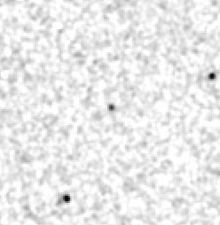Lysithea (moon)
moon of Jupiter
Lysithea (/laɪˈsɪθiə/ ly-SITH-ee-ə, /liˈsɪθiə/ li-SITH-ee-ə; Greek: Λυσιθέα) is a prograde non-spherical moon of Jupiter. It was found by Seth Barnes Nicholson in 1938 at Mount Wilson Observatory[1] and is named after the mythological Lysithea, daughter of Oceanus and one of Zeus' lovers.[4]
 | |
| Discovery | |
|---|---|
| Discovered by | S. B. Nicholson |
| Discovery date | July 6, 1938[1] |
| Designations | |
| Adjectives | Lysithean |
| Orbital characteristics | |
Mean orbit radius | 11,720,000 km[2] |
| Eccentricity | 0.11[2] |
| 259.20 d (0.69 a)[2] | |
Average orbital speed | 3.29 km/s |
| Inclination | 28.30° (to the ecliptic) 25.77° (to Jupiter's equator)[2] |
| Satellite of | Jupiter |
| Physical characteristics | |
Mean radius | 18 km[3] |
| ~4100 km2 | |
| Volume | ~24,400 km3 |
| Mass | 6.3×1016 kg |
Mean density | 2.6 g/cm3 (assumed)[3] |
| ~0.013 m/s2 (0.001 g) | |
| ~0.022 km/s | |
| Albedo | 0.04 (assumed)[3] |
| Temperature | ~124 K |
Lysithea did not get its present name until 1975; before then, it was simply known as Jupiter X. It was sometimes called "Demeter"[5] from 1955 to 1975.
It belongs to the Himalia group, five moons orbiting between 11,000,000 and 13,000,000 km from Jupiter at an inclination of about 28.3°.[2] Its orbital elements are as of January 2000. They are changing a lot due to Solar and planetary perturbations.
References
change- ↑ 1.0 1.1 Nicholson, S. B. (October 1938). "Two New Satellites of Jupiter". Publications of the Astronomical Society of the Pacific. 50 (297): 292–293. Bibcode:1938PASP...50..292N. doi:10.1086/124963. S2CID 120216615.
- ↑ 2.0 2.1 2.2 2.3 2.4 Jacobson, R.A. (2000). "The orbits of outer Jovian satellites" (PDF). Astronomical Journal. 120 (5): 2679–2686. Bibcode:2000AJ....120.2679J. doi:10.1086/316817. S2CID 120372170.
- ↑ 3.0 3.1 3.2 "Planetary Satellite Physical Parameters". JPL (Solar System Dynamics). Retrieved 2008-12-12.
- ↑ Marsden, B. G. (7 October 1974). "Satellites of Jupiter". IAUC Circular. 2846.
- ↑ Payne-Gaposchkin, Cecilia; Katherine Haramundanis (1970). Introduction to Astronomy. Englewood Cliffs, N.J.: Prentice-Hall. ISBN 0-134-78107-4.
Other websites
change- Lysithea Profile Archived 2015-08-03 at the Wayback Machine by NASA's Solar System Exploration
- David Jewitt pages
- Scott Sheppard pages